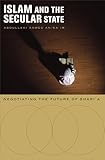Islam and the secular state : negotiating the future of Shariʻa / Abdullahi Ahmed An-Naʻim.
Material type: TextPublisher: Cambridge, Mass. : Harvard University Press, 2008Description: x, 324 p. ; 25 cmISBN: 9780674027763 (alk. paper); 0674027760 (alk. paper); 9780674034563 (pbk.); 0674034562 (pbk.)Subject(s): Islam and secularism | Islam and state | Islamic law | Religious pluralism -- IslamDDC classification: 297.2/72 LOC classification: BP190.5.S35 | N35 2008Online resources: Table of contents
TextPublisher: Cambridge, Mass. : Harvard University Press, 2008Description: x, 324 p. ; 25 cmISBN: 9780674027763 (alk. paper); 0674027760 (alk. paper); 9780674034563 (pbk.); 0674034562 (pbk.)Subject(s): Islam and secularism | Islam and state | Islamic law | Religious pluralism -- IslamDDC classification: 297.2/72 LOC classification: BP190.5.S35 | N35 2008Online resources: Table of contents | Item type | Current library | Call number | Copy number | Status | Notes | Date due | Barcode |
|---|---|---|---|---|---|---|---|
 Books
Books
|
Female Library | BP190.5 .S35 N35 2008 (Browse shelf (Opens below)) | 1 | Available | STACKS | 51952000113263 | |
 Books
Books
|
Main Library | BP190.5 .S35 N35 2008 (Browse shelf (Opens below)) | 1 | Available | STACKS | 51952000139843 |
Browsing Female Library shelves Close shelf browser

|

|

|

|

|

|

|
||
| BP190.5 .I85 2013 Islamic fashion and anti-fashion : new perspectives from Europe and North America / | BP190.5 .S3 D35 2010 Islam, science, and the challenge of history / | BP190.5 .S3 M67 2007 Islam and science : the intellectual career of Niẓām al-Dīn al-Nīsābūrī / | BP190.5 .S35 N35 2008 Islam and the secular state : negotiating the future of Shariʻa / | BP190.5 .T37 2010 Visibly Muslim : fashion, politics, faith / | BP190.5.A7 .E45 2012 Aisha's cushion : religious art, perception, and practice in Islam / | BP190.5.D56 .I84 2016 Islam and international relations : contributions to theory and practice / |
Includes bibliographical references (p. 295-309) and index.
Introduction : why Muslims need a secular state -- Islam, the state, and politics in historical perspective -- Constitutionalism, human rights, and citizenship -- India : state secularism and communal violence -- Turkey : contradictions of authoritarian secularism -- Indonesia : realities of diversity and prospects of pluralism -- Conclusion : negotiating the future of Shariʻa.
"What should be the place of Shari'a - Islamic religious law - in predominantly Muslim societies of the world? In this ambitious and topical book, a Muslim scholar and human rights activist envisions a positive and sustainable role for Shari'a, based on a profound rethinking of the relationship between religion and the secular state in all societies." "An-Na'im argues that the coercive enforcement of Shari'a by the state betrays the Qur'an's insistence on voluntary acceptance of Islam. Just as the state should be secure from the misuse of religious authority, Shari'a should be freed from the control of the state. State policies or legislation must be based on civic reasons accessible to citizens of all religions. Showing that throughout the history of Islam, Islam and the state have normally been separate, An-Na'im maintains that ideas of human rights and citizenship are more consistent with Islamic principles than with claims of a supposedly Islamic state to enforce Shari'a. In fact, he suggests, the very idea of an "Islamic state" is based on European ideas of state and law, and not on Shari'a or the Islamic tradition."--Jacket.
1 2

There are no comments on this title.